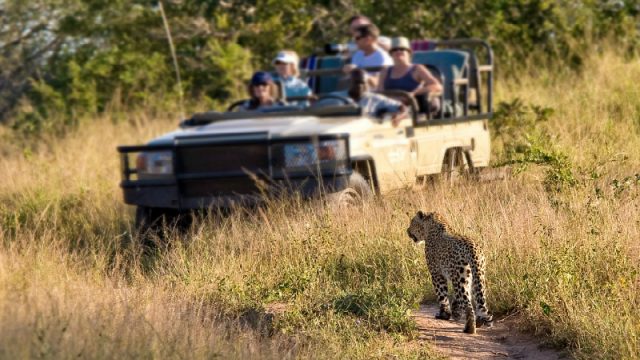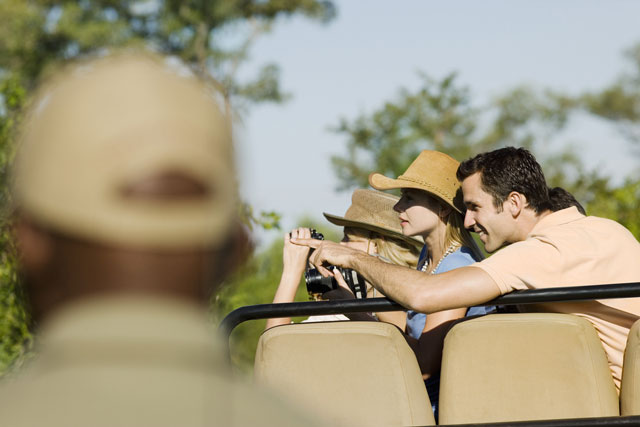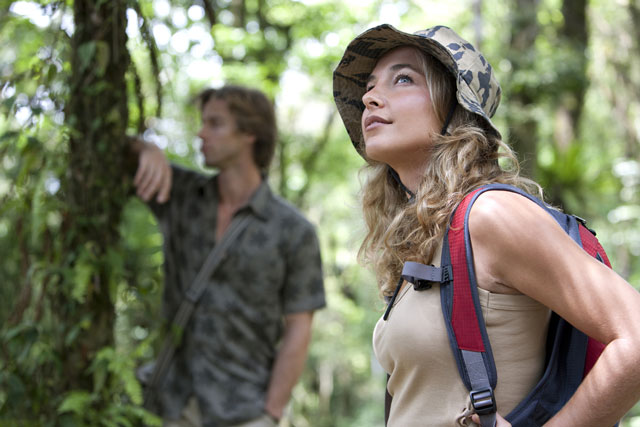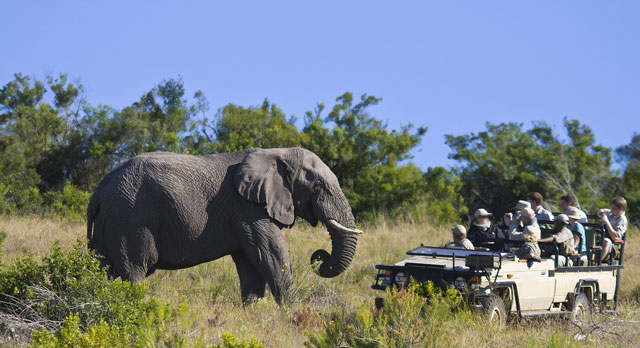When packing for a safari you might add a pith helmet, khaki vest and leather boots to your checklist, like the old colonialists of the late 1800s. Alternatively, you might think that a giant camera and a week’s supply of water are the only necessary supplies. Well, both scenarios are off base. Before deciding what items to bring on safari you should first ask your lodge or camp for advice, then read this handy list.
Proper Clothing
First things first: you need something to wear. It’s actually OK to bring the khakis (or similar neutral colors) as they won’t draw unwanted attention from dangerous animals and insects. Pack slightly less than you normally would depending on the length of your stay; a few shorts, a few shirts, and some cargo pants should suffice, but make sure they are lightweight and comfortable. Cotton items tend to be most comfortable in a hot environment. Though temperatures can soar in the daytime, things can get downright chilly as soon as the sun goes down (even in the summer). So it’s a good idea to have a light fleece garment on hand, especially if the excursion extends after sundown or if it’s a night drive. You might also need the fleece on brisk early morning drives, when there’s still a chill in the air.

Photo courtesy of Pixabay
Headlamp
Did we mention safaris often go on until after dark? Take a headlamp instead of a flashlight to more easily see into the bush. You never know what side of the 4×4 an animal will approach, plus wearing a headlamp keeps your hands free for taking impromptu photos that need extra stability in low-light conditions. While you can spend upwards of $500 for one, headlamps in the $20-40 dollar range should suffice. Tip: Before you leave, ask your lodge if they have headlamps you can borrow.
Extra Memory Cards
It goes without saying that you’ll want to bring a camera along on safari. Whether it’s a simple point-and-shoot or a DSLR, it’s practically mandatory. But not everybody thinks to bring an extra memory card. You might find yourself shooting so many pictures (and videos) that your card will fill up quickly. Which means you’ll want to swap it out on the fly, since you can’t download those pics to your laptop in the middle of a game drive! Memory cards are so cheap these days that it isn’t worth the risk of missing a great shot.

Photo courtesy of flickr.com
Sun Protection
While a pith helmet is certainly not necessary unless you want to look like a ridiculous colonial-era relic (or an extra in a period film), you will thank yourself for bringing a good hat (not a baseball cap) that keeps the sun off your face and neck. It will save you from a red blistery sunburn, which means there is no need to bring skin-saving aloe (one less item in your suitcase). Many people swear by Tilley hats — though they are a bit pricey — but you can find something similar at most outdoor stores. Try to get one with a cord so it doesn’t fly off your head when you are leaning out of the window of the safari vehicle. Sunglasses can also cut down on glare and help you spot animals, and keep you from having to pick out gnats out of your eyelids. But there is no need to go overboard and buying an expensive pair; these days most sunglasses over $20 have adequate UV protection. Some sunblock and lip balm with at least SPF 15 could also prove useful if you are prone to getting sunburned.
Binoculars
While you could try to view animals through the zoom lens on your camera, it likely won’t have the magnification power of a good set of binoculars. Binocs allow you to zoom in and out quickly and focus with great clarity. You might even spot an animal before your guide does if you look closely enough. REI has a great guide to picking out the perfect pair for your needs.
Tissues
Cruising in a Land Rover down a bumpy road can stir up a lot of dirt in the air, and depending on the direction of the wind, can get a good amount of dust and dirt up your nose. It’s nice to be able to grab for a tissue to breath easily again. Wet wipes will also do the trick.
Snacks
There will probably be snacks available at the lodge before you head out on safari, but if you are the type of person that craves certain items, its good to have them handy on long game drives. Many safaris stop and take a break for lunch, but you can’t always guarantee the food will be to your liking. Definitely grab a few bottles of water and some energy bars before you head out if your guide isn’t bringing extras.
Safari Journal
A safari journal contains information about the flora and fauna you’ll likely see, as well as blank space for jotting down your thoughts. Get one specific to the area you will be visiting because it will help you recognize animals and plants as soon as you see them, and for those that you only get a quick glimpse of, allow you to research them further in the evening. Most major bookstores carry several wildlife journals to pick from.
Travel Bag
You don’t want to carry tons of stuff around your neck or in the pockets of your cargo pants, nor do you want to put it in a plastic bag that is going to break a few hours into your trip. So if you don’t have one already, invest in a lightweight travel bag that you can sling over your shoulder. Brands like Kelty, North Face and Osprey tend to make the best bags, though you probably have a family member with one stuffed in their garage that they haven’t used since that camping trip last summer. A good bag will also give you room to stuff all those non-essential items you might decide you need at the last minute.
An Open Mind
It’s crucial to let go of any preconceived notions you already have about safaris. It may not play out like you expect. You might not see that many animals, or they might startle you by jumping on the roof of your vehicle. You might think you are stoic, but get frightened by an up-close encounter with an elephant. Or you might get very bored by the endless driving and searching. Local customs in your country of choice will also be different from what you expect, so be polite, thank your guide and enjoy the ride.
Related content on AFKTravel:
Otherworldly Escapes: Namibia’s Best Remote Safari Camps
Walking Safaris: The Ultimate Adrenaline Rush
QUIZ: Test Your Safari IQ
Want to discover the finer side of Africa? Sign up for our weekly newsletter.









